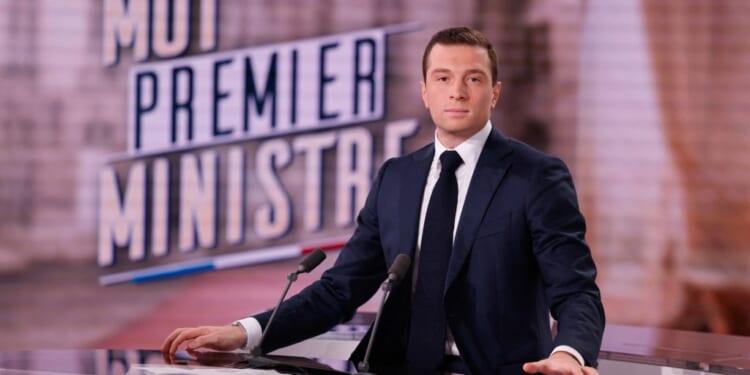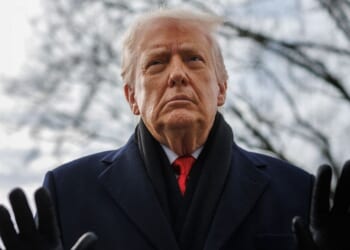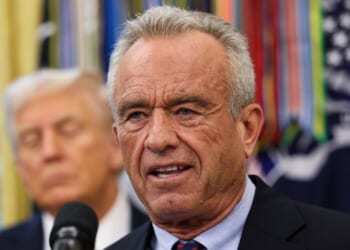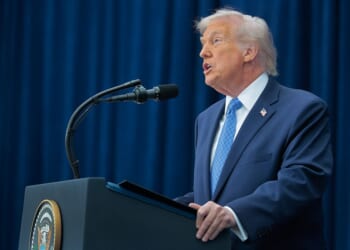Political punditry often falls prey to a common logical error: the fallacy of composition. It loves to generalise from a single observation. And the most common misjudgement I’m hearing at the moment concerns the European far-Right. The assumption is that when — or if — they gain power, they will all end up like Giorgia Meloni.
Italy’s prime minister may have started as an anti-European, but she governs today as a pro-European moderate — or, as she would say, a “euro-realist”. And the received wisdom in Europe is that the French far-Right will do the same. But this is to fundamentally misunderstand Le Pen’s National Rally. Her party could not be more different from Meloni’s Brothers of Italy. For one thing, the two have occupied opposing positions on the political spectrum — particularly on Nato and Europe. To expect the French far-Right to ape Meloni’s softening stance, then, is to fall prey to the fallacy of composition.
Meloni has been on quite a political journey. She entered politics in the Nineties as a youth activist for Italian Social Movement: the postwar neo-fascists. In 1995, its leader, Gianfranco Fini, reconstituted the party as the National Alliance — a new iteration which embraced liberal democracy, membership of Nato, and European integration. It was Fini, not Meloni, who turned Italy’s far-Right into a pro-European, pro-Establishment movement. He later became one of Silvio Berlusconi’s most senior ministers and one of the most pro-European voices in his cabinet.
In 2009, Fini merged his National Alliance into Berlusconi’s party, and then, in 2012, Meloni left the group to become leader of a new party: the Brothers of Italy. Her party was further to the Right than Fini, but still rejected fascism. And Meloni was a eurosceptic, very much in the mould of Britain’s British Conservatives pre-Brexit. But she has played the bloc to her advantage, and Italy is increasingly seen as a credible and stable partner.
Things couldn’t be more different in France, where the towering figure of the far-Right is Marine Le Pen, president of National Rally. Though she is currently banned from standing for political office for five years, this has not affected her party’s ratings. Her 30-year-old protégé, Jordan Bardella, has assumed leadership and is currently polling between 35 and 37.5% of voting intentions in the first round of the next presidential elections. The second-placed candidate is the former prime minister Édouard Philippe, who is at 15-19.5%. While it is hard to translate these numbers into second-round votes, for the first time it does look like the far-Right has a real crack at winning the French presidency.
The party has come some way since it was founded by Marine’s father, the late Jean-Marie Le Pen, in 1972 as the National Front. It took a hard line on membership of the European Economic Community — as it was then called — on the grounds that it constituted a threat to French sovereignty. Le Pen Snr later rejected the single market, the euro, and Schengen. But he never got close to power.
His clan, though, still rules. And its ideology still holds. Under Marine’s leadership, the party’s position on Europe did seem to soften a little. She still wanted to exit the euro and Schengen, but not the EU itself. Instead, she wanted to renegotiate treaties. In practice, of course, this would not have been possible, so her position was never fundamentally different from Frexit — except in tone.
Le Pen doubled down on her euro exit theme in the elections of 2017, and lost to Emmanuel Macron — the extremism of her narrative clearly contributing to her defeat. So, in 2018, she renamed the party National Rally and changed its message from exiting the EU altogether, to reforming it from within. Superficially this might sound like a Meloni shift. But in reality, it means something different, which became brutally clear in last year’s parliamentary elections.
After National Rally scored won a landslide victory — its biggest yet — in the 2024 European elections, Macron called a snap election for the French National Assembly. Bardella assumed charge of the party and, at one point during the campaign, it did look on the verge of achieving a political majority. This was only thwarted at the last minute when, panic-stricken, the opposition parties formed an alliance to force the far-Right into third place.
But over the course of those two elections, the party’s position on European integration hardened significantly. With Bardella as leader, he called for a referendum to reaffirm the primacy of the French constitution over European law and during the European campaign he came up with the idea of a stratégie tricolore: a menu of European integration dishes from which France would order as it saw fit.
The green category represents the European integration the party approves of — so, industrial policies, and scientific exchanges. The orange category contains those policy fields France would want to renegotiate — such as Schengen and the single market. And the red category holds the hard no-go areas — migration, energy, defence, borders. Bardella wants to prioritise French citizens for jobs, and reverse free movement. Tell me that you want to leave the EU, without telling me that you want to leave the EU. That’s Bardella.
“Tell me that you want to leave the EU, without telling me that you want to leave the EU.”
His agenda is clearly incompatible with EU membership. In the past, the EU has displayed a good deal of forbearance when confronted with French rule-breaking — for example on fiscal deficits. But this goes too far. The EU could never accept a French proposal to change freedom of movement unilaterally. So while the National Rally might not campaign on a leaving the EU platform, it will end up breaking so many of its rules that a Frexit would be the only way to deliver on its campaign promises.
If you were left in any doubt, here’s more. In an interview with The Economist last week, Bardella said he wants the ECB to buy French debt. France is Europe’s largest debtor — and the debtor with the greatest exposure to investors from outside Europe. Technically, the ECB could do this. It has a tool it calls the “transmission protection instrument”, which would allow it to buy French bonds during a financial crisis. The argument in favour of a central bank bailout is that France is simply too big to fail. As president or prime minister, Bardella could threaten the ECB with a unilateral default.
It is easy to dismiss his comments as utter nonsense, as one French economist did in a conversation with me last week. I take it seriously, though, because a French government under Le Pen or Bardella could take Europe to the brink. France is a powerful agent. It is not Greece. Or Italy. Bardella also wants an EU budget rebate, like Margaret Thatcher once did. This would push an under-resourced EU that has over-committed itself on Ukraine into an existential crisis.
Such a scenario could not be more different from what happened in Italy under Meloni. Italy has constitutional safeguards in place against a unilateral withdrawal from the euro and international treaties. Meloni’s pragmatism makes perfect sense. She is attempting to make the bloc work in Italy’s interests. It is quite a different scenario in France where the constitution gives the President powers that are without parallel in west European democracies. The EU would not break up the moment the National Rally got into power. But there would be cardiac arrest soon afterwards.

















